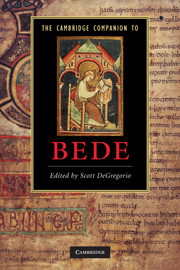8 - Bede and science
from Part II - Bede's Writings
Published online by Cambridge University Press: 28 January 2011
Summary
Readers of the Ecclesiastical History may be tempted to skip the opening chapter, which seems to be more about obsolete geography than about history. Yet this prologue tells us much about Bede's conception of science and its place within his wider enterprises of learning. First, the island of Britain is carefully measured in its length, breadth and coastal circumference. Then there follows a catalogue of the island's natural endowments: its plant and animal life, its hot and salt springs and its minerals. Britain literally exudes health: its waters have medicinal properties, and the jet from its mines repels serpents. Finally, the northerly latitude of Britain makes for exceptionally long summer days and winter nights. One could say, then, that Bede frames his vision of English identity by measured space, measured time and an inventory of the natural world. These two signposts - nature and measurement - also mark off the frontiers of Bede's science. They are the substance of his two early treatises On the Nature of Things (c. 703) and On Times (703), and they are woven together in his magisterial The Reckoning of Time (725).
- Type
- Chapter
- Information
- The Cambridge Companion to Bede , pp. 113 - 126Publisher: Cambridge University PressPrint publication year: 2010
- 7
- Cited by

